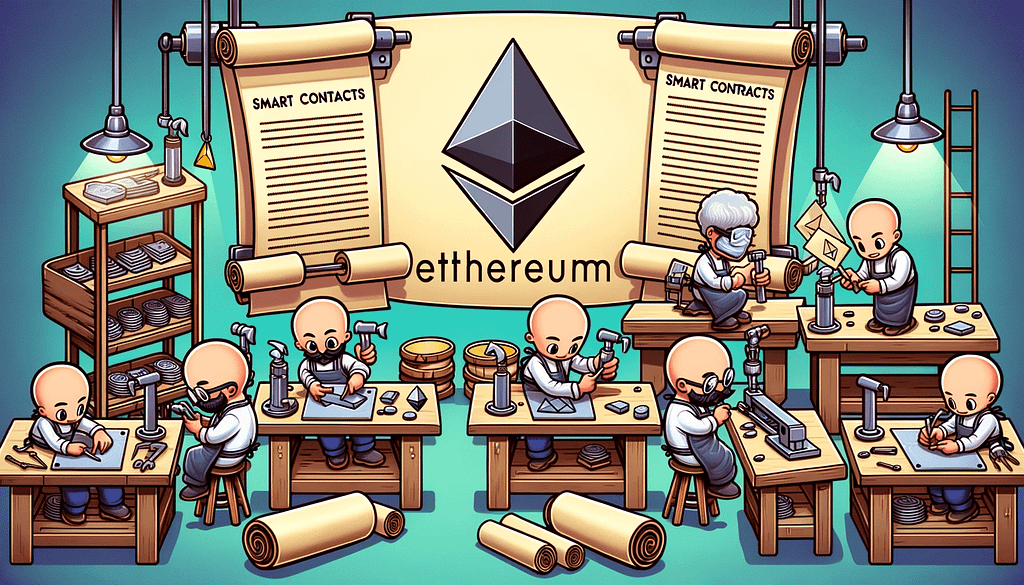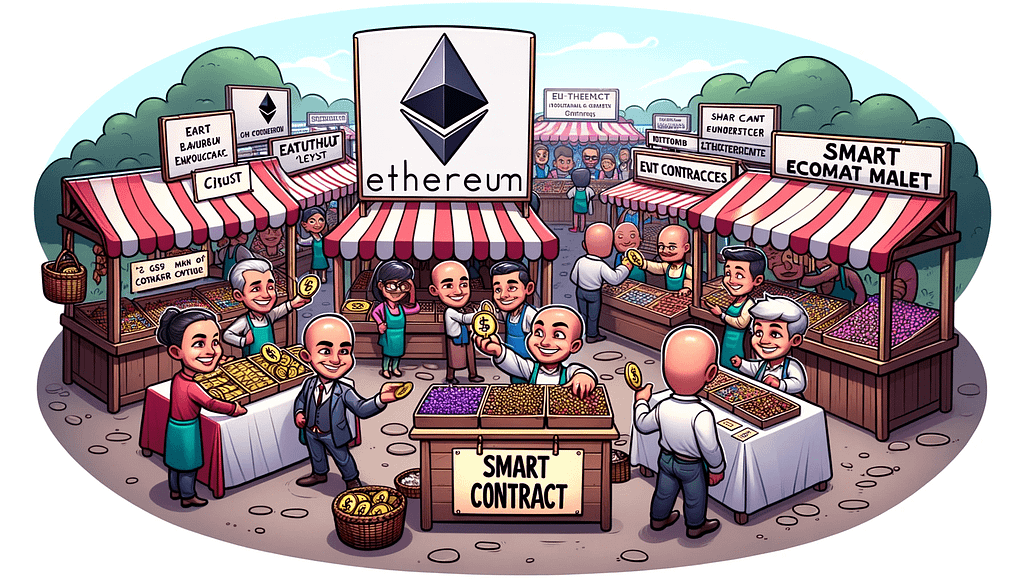Want to know who invented Ethereum, the second-largest cryptocurrency by market capitalization? The Origins of Ethereum trace back to the early days of Vitalik Buterin, a visionary, and mastermind behind this revolutionary blockchain technology. Alongside a founding team, Buterin played a pivotal role in the birth and development of Ethereum. His contributions have not only revolutionized smart contracts and decentralized applications but also left an enduring legacy in the crypto market.
Vitalik Buterin, along with a founding team, is responsible for inventing Ethereum, a revolutionary blockchain technology. His visionary contributions have not only revolutionized smart contracts and decentralized applications but have also had a significant impact on the crypto market. Ethereum's invention has left an enduring legacy that continues to shape the future of blockchain technology.
Vitalik Buterin's ingenious mind and collaboration with a founding team birthed Ethereum, a groundbreaking blockchain technology. By introducing smart contracts and decentralized applications, Buterin's contributions have revolutionized the crypto market and left an indelible mark on the industry. Ethereum's invention has paved the way for the future of blockchain technology, solidifying Buterin's position as a visionary leader in the field.
The Early Days of Vitalik Buterin
Vitalik Buterin, the brilliant mind behind Ethereum, began his journey in the early days of blockchain technology. With a passion for decentralized systems and a deep understanding of cryptography, Buterin embarked on a mission to create a platform that would revolutionize the way we interact with digital assets. Through persistence and dedication, Buterin and his founding team successfully developed Ethereum, laying the foundation for a new era of blockchain innovation.
Continuing to build upon his initial vision, Buterin's relentless pursuit of scalability and efficiency led to the development of Ethereum 2.0, a major upgrade that promises increased transaction capacity and reduced energy consumption. This upgrade has garnered significant attention and anticipation within the crypto community, further solidifying Buterin's reputation as a pioneer in the field. As Ethereum continues to evolve and thrive, Buterin's contributions remain integral to its success, shaping the future of decentralized finance, digital identities, and countless other applications within the blockchain ecosystem.
Buterin's innovative mindset and deep understanding of blockchain technology have positioned him as a thought leader in the industry which many developers continue to look up to for inspiration. His groundbreaking work on smart contracts has revolutionized the way transactions are conducted, enabling secure and transparent interactions without the need for intermediaries. As a result, Ethereum has become the go-to platform for decentralized applications, attracting developers and enthusiasts from around the world. With Buterin at the helm, Ethereum is poised to lead the charge in driving the widespread adoption of blockchain technology and ushering in a new era of decentralized innovation.
Buterin's vision extends beyond just Ethereum, as he actively collaborates with other blockchain projects to foster cross-chain interoperability and scalability. With his guidance, Ethereum is poised to continue pushing the boundaries of what is possible in the blockchain space, fueling the growth of the decentralized economy and empowering individuals worldwide.
What Are Smart Contracts?

Smart contracts are self-executing contracts with the terms of the agreement directly written into code. They were first introduced by Nick Szabo, a renowned computer scientist and legal scholar. Smart contracts automate the enforcement and execution of agreements, enabling reliable transactions without the need for intermediaries. These contracts run on blockchain technology, providing security, transparency, and immutability.
With their ability to streamline and automate complex processes, smart contracts have revolutionized various industries, including finance, supply chain management, and decentralized applications.
Their potential for efficiency and trustworthiness has made them a cornerstone of blockchain platforms like Ethereum, attracting developers and businesses alike. Through his groundbreaking work on smart contracts, Szabo has paved the way for a new era of secure and decentralized interactions.
They have also sparked innovation and experimentation in the field of decentralized finance (DeFi), where smart contracts are used to create and manage financial instruments like lending protocols, decentralized exchanges, and stablecoins.
This has opened up new opportunities for individuals to access financial services without relying on traditional intermediaries. Moreover, the programmable nature of smart contracts allows for the creation of sophisticated decentralized applications (dApps) that can operate autonomously and securely on the blockchain which is a vast improvement over legacy financial systems. As more developers explore the potential of smart contracts, we can expect further advancements in blockchain technology and its applications in various sectors. Ultimately, smart contracts have transformed the way agreements are made and executed, ushering in a new era of efficiency, transparency, and trust in digital transactions that were once impossible.
They have also paved the way for the emergence of decentralized autonomous organizations (DAOs), which are governed by smart contracts and operate without a central authority. DAOs enable community-driven decision-making and resource allocation, revolutionizing traditional organizational structures.
Additionally, smart contracts have facilitated the tokenization of assets, making it possible to represent real-world assets digitally on the blockchain. This opens up avenues for fractional ownership, increased liquidity, and greater accessibility to investment opportunities.
With the increasing adoption of smart contracts, we can anticipate a further disruption of traditional industries and the emergence of new business models that leverage the power of blockchain technology.
Ethereum's Influence On The Crypto Market

As the number two cryptocurrency in terms of market capitalization, Ethereum has emerged as a powerful force in the digital currency space. With its open-source blockchain platform, Ethereum not only experiences the highest levels of developer activity but also attracts significant attention from institutions across various industries.
Ethereum's appeal lies in its potential to revolutionize multiple sectors beyond just finance. As I've mentioned in my personal settings, some even refer to Ethereum as the next generation of the Internet, often dubbed Internet 2.0.
Similar to how the Internet transformed the way we connect and communicate, Ethereum has the potential to reshape how we transact and interact with one another. Its decentralized nature ensures transparency, security, and efficiency, removing the need for intermediaries in various processes.
Moreover, Ethereum's vibrant community of developers and contributors is constantly pushing the boundaries of what is possible, expanding the platform's capabilities and fostering new applications. This ongoing development activity creates a dynamic ecosystem where ideas and innovations can flourish.
Additionally, the increasing interest from institutions further validates Ethereum's potential. From financial institutions exploring blockchain-based solutions to companies in sectors like supply chain management and healthcare embracing Ethereum's technology, the platform is gaining traction across various industries.
However, it's important to note that with any rapidly evolving technology, there are also challenges and risks. The scalability of Ethereum, for instance, has been a topic of discussion, with efforts being made to address this issue through upgrades like Ethereum 2.0.
Ethereum's position as the second-largest cryptocurrency and its widespread adoption among developers and institutions solidify its status as a groundbreaking platform. With its potential to revolutionize industries and reshape how we interact digitally, Ethereum holds the promise of being a transformative force in the world of technology and finance.
The Struggles of Ethereum

From financial institutions exploring blockchain-based solutions to companies in sectors like supply chain management and healthcare embracing Ethereum's technology, the platform is gaining traction across various industries. However, it's important to note that with any rapidly evolving technology, there are also challenges and risks. The scalability of Ethereum, for instance, has been a topic of discussion, with efforts being made to address this issue through upgrades like Ethereum 2.0. The struggles of Ethereum highlight the complexities inherent in pushing the boundaries of blockchain technology, but its potential for revolutionary change cannot be denied.
As the demand for Ethereum grows, so does the need to overcome its scalability limitations. The development of Ethereum 2.0 aims to address this concern by introducing a more efficient and scalable infrastructure through the implementation of a proof-of-stake consensus mechanism. Additionally, the Ethereum community actively collaborates to find innovative solutions, such as layer-two scaling solutions, to enhance the network's capacity.
Ethereum Layer Two scaling solutions refer to a series of technologies built "on top" of the Ethereum blockchain (the base layer) to improve its scalability and efficiency. They aim to reduce congestion on the network by taking some computation and storage off-chain while maintaining the security of the Ethereum blockchain.
1. Rollups: These are solutions that execute transactions off-chain into a sidechain, aggregate them, and then post the final state to the Ethereum network. There are two types: Optimistic Rollups and ZK-Rollups.
2. State Channels: This is a two-party interaction protocol where the parties agree to make transactions off-chain, which are then settled on-chain in a single transaction.
3. Sidechains/Plasma: Sidechains are separate blockchains that run parallel to the Ethereum mainnet and use the same ETH token. Plasma is a type of sidechain solution that allows for the creation of "child" chains linked to the "main" Ethereum chain.
4. Hybrid solutions: These are combinations of the solutions above, designed to maximize efficiency and scalability. All these solutions help alleviate the issue of high fees (gas costs) and slow transaction times on Ethereum caused by network congestion.
In conclusion, despite its challenges, it is undeniable that Ethereum possesses immense potential in the world of cryptocurrency. With its visionary founder leading the way, Ethereum stands as a driving force in revolutionizing the financial landscape. Investors would be wise to keep a close eye on this groundbreaking platform as it continues to push the boundaries of innovation and reshape the future of digital currency.
Matt is the founder of TechMalak. When he's not buried face-deep in the crypto charts you can find him tinkering with the latest tech gadgets and A. I tools. He's a crypto investor and entrepreneur. He uses a mixture of A.I and human thought and input into all his articles on TechMalak, further merging man with machine.





